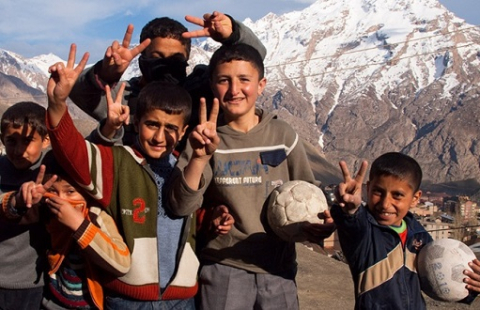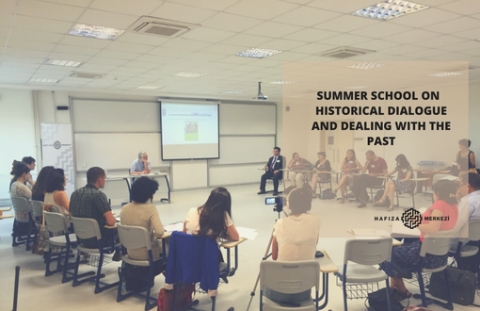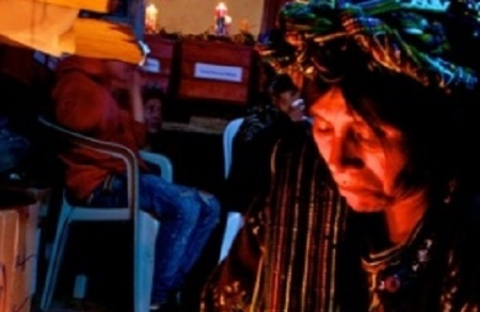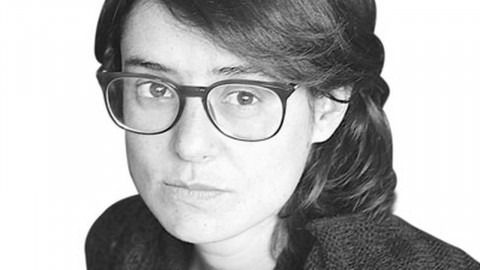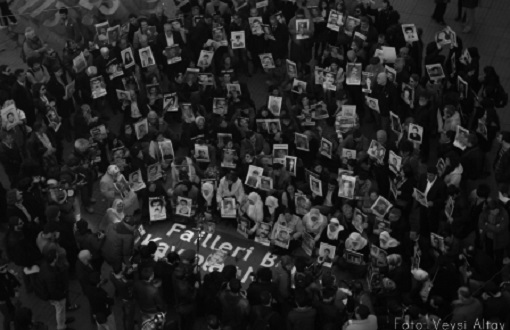
Truth, justice, memory and the peace process
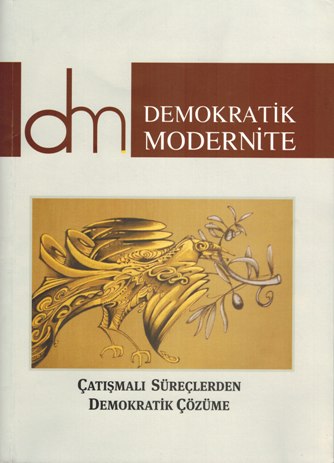
Murat Çelikkan
Let me begin by saying what I would have said at the end of this article: In order to constitute social reconciliation in the aftermath of periods of violent conflict or oppression, it is essential to investigate intense human rights violations that took place in the past, and to reveal the truth.
A coming to terms with the past can only be realized when human rights violations are revealed, the perpetrators are brought to justice and the damage caused by such violations is repaired and compensated by introducing restorative justice mechanisms.
This is because one of the most essential elements in coming to terms with the past and the establishment of justice is the reconstruction of social memory in a manner that covers all systematic human rights violations.
This is, in fact, the summary of an article to be written on the peace process in terms of truth, justice and memory.
Now, before we return to this issue, let us give a name to the present process. Today, we are experiencing a rapid process of change. It has been called the Peace Process.
If the process develops as we expect, we will manage to get, instead of war, conflict, or rebellion –whatever you want to call it – an environment of peace, defined by an absence of clashes. This process will be finalized by a period of social reconciliation, although it might not include all individuals involved. If we are genuinely talking about peace, then it will be necessary to agree upon the truths, a set of values, social priorities and the regime. Similar processes in the world that have been carried out in the past 20 years strive towards human rights and accountability centered approaches. Such an approach adopts human rights as an area of potential agreement for various social groups that have clashed with each other, and have drawn different conclusions from, have different historical reasons for and have different stories regarding the conflict and the events. It is impossible to speak of a lasting peace without these. This is of course a task that takes time, even if a right path is taken.
However, before this path can be taken, there is of course a political decision-making and negotiation process that must be completed. This process in Turkey is not transparent as of yet. And in my opinion, it is debatable how objectively transparent it can be. This is not a linear process, whatever the initial accord may be, the stance of political actors, their expectations and assessments, and their approach throughout the process will determine the atmosphere of the entire process.
There is also a ‘security’ process introduced by states following this fundamental political agreement, in order to prevent the renewal of conflict. This is known in international terminology as the ‘DDR’ process, or “Disarmament, Demobilization, Reintegration’’. [1]
DDR is the planning and realization of the stage that begins with an absence of conflict, and continues with the integration of guerrilla forces (and sometimes paramilitary forces) to social and political life. However, DDR programs are necessary but not sufficient for peace building. Conventional approaches to DDR, and the experiences of the past 30 years reveal that military and security targets are often preferred objectives, and that processes where the social dimension of the issue is not taken into consideration often fail to provide a lasting state of peace.
For transition processes from dictatorship to democracy, or from war to peace, the keywords in international terminology in social terms are truth, justice and memory. Before focusing individually on these concepts, I would like to point out one of the most popular fields of political science and the human rights struggle in the last 30 years: The issue of ‘Transitional Justice’, since Transitional Justice provides the framework not only of the aforementioned keywords, but also of peace building for social reconciliation and a democratic, egalitarian order, respectful to human rights. Today, ICTJ (International Centre for Transitional Justice) [2], a New York-based international civilian society organization provides support to states, civilian society organizations and victims’ organizations. These programs presently continue in 8 African, 7 American, 7 Asian, 2 European and 7 Middle Eastern and North African countries.
This is the stage that we arrive at the issue of truth, justice and memory, each worthy of examination as a separate discipline. Before we treat these fields separately, let us take a look at the set of mechanisms known as Transitional Justice.
Transitional justice
The concept of Transitional Justice is used to define a new kind of human rights activity, and is composed of a set of tools and methods that may solve the contradictions that emerge within the context of ‘transition’.
Ban Ki-Moon, the Secretary-General of the United Nations, defined transitional justice as follows: “Significant targets for sustainable peace include investigation of gross human rights violations, reparation of past injustices and ensuring that they are never repeated again.” [3] Ban Ki-Moon later expanded this definition he made in 2004 in the following manner: “…transitional justice is the full range of processes and mechanisms associated with a society’s attempt to come to terms with a legacy of large-scale past abuses, in order to ensure accountability, serve justice and achieve reconciliation
These may consist of both judicial and non-judicial processes and mechanisms open to international participation at various levels, but nevertheless must include the entirety of individual convictions, prosecutions, compensations, search for truth, institutional reform, suspensions and reinstatements, memorialisation studies and local or traditional mechanisms of justice.
Economic and social institutional inequalities, and discriminations and inequalities experienced within the context of social gender must also be added to this list.
Historical background
A very brief historical background might reveal the three reasons why this approach has proved so popular. The first of these is the ‘obligatory’ change in the human rights movement. The main aim of the international human rights movement, until the mid-1980s was to criticize and apply pressure on oppressive states to treat their citizens in a more just manner. However, there were changes in the strategies and approaches of these institutions when the oppressive regimes of Latin America were abolished in the period from the beginning to the end of the 80s. According to Juan Méndez, an Argentinean exile, and former director of Human Rights Watch and ICTJ, “ as the Alfonsin government mounted prosecutions of military leaders and formed a commission of inquiry into state-led abuse, human rights work “almost seamlessly turned … from an adversarial to supportive position.”[4]
The fact that the seats in which representatives of the human rights movement sat in court change might explain this situation more clearly. Representatives of the movement began to intervene not on the side of the suspects but the prosecutors in trials after the ‘transition’, because it was no longer the victims but the perpetrators that were tried.
Another reason is the fact that the socio-economical evolution approach was replaced by a series of technocratic approaches aimed at engineering political changes. A further reason for this paradigm change is the belief that democracy can blossom in all countries regardless of socio-economic conditions, or in other words, a belief that long-term socio-economic stages were not necessary, and democracy could be realized via a shorter-term series of legal-institutional reforms.
The final reason is a development again related to the previous reason. Another factor in the concept of ‘transition’ being introduced regarding the target of democratization is the global decline of the Left in the 1970s, and the ideological focus switching to the demand for human rights.
This is, of course, a framework that is open to broad debate. Paige Arthur, justifies this change in her article as follows [5]: “In sum, the attractiveness of a transitions to democracy paradigm ought to be understood against the backdrop of four conditions: in most of the countries undergoing political change, democracy was a desirable goal for many people; the delegitimation of modernization theory; the transformation of the transitions concept from a tool of socioeconomic transformation to one of legal-institutional reform; and the global decline of the radical Left. This last phenomenon, I have suggested, had direct repercussions for the human rights movement, as many on the Left abandoned the language of class warfare to describe state violence in favor of the language of human rights.”
Examining the relationship of the Latin American left with socialism, Ronaldo Munck reaches this conclusion: “The struggle against military rule had centered largely around the issue of human rights, a defensive politics which took over from the vision of a socialist alternative.” [6] And James Petras comments: “State violence was analyzed in terms of human rights violations, not as expressions of class domination.” [7]
Of course, it is necessary not to forget that this framework was specifically developed for the transition from dictatorship to democracy. The problems actors of the process may face in building peace may show differences from this framework. However, the fact that this framework accepts that democratization is a prerequisite to establish a lasting peace leads me to think that it can work for Turkey, too.
Let us now return to our keywords…
Truth
The fundamental fact that needs to be acknowledged first and foremost if the issue is to initiate the construction of a new society -not using the lies of war in building peace, enabling the voice of the victims to be heard, taking steps in social improvement- is that a new society and a new period cannot be formed with lies and half-truths. This is why the truths that have been covered up and distorted by oppressive regimes in collaboration with the media, judicial institutions, bureaucracy, army and political power need to be unearthed.
However, philosophical truth, especially in the postmodern period, is no longer defined as the ‘absolute truth’: [Now, there are different types of truth like forensic or medical truth, in other words, objective truth based on evidence; truth that emerges from debate; healing, restorative truth; truth that emerges from dialogue; and the truth that emerges from narrative. All these types of truth indicate different methods in terms of social healing and reconciliation; however, what they have in common and is used in these processes can be summarized as follows: The voicing of the truth that arises from victims narrating their own stories and experiences, and the entering of this truth into circulation.
This is important not only in terms of victims recounting their experiences in public spaces, but also to determine the perpetrators. In other words, the truth is important not only for the empowerment of victims, but also to introduce into society a discourse respectful to human rights. These narratives are also important in terms of forgiveness. As the daughter of one of the victims in the group known as the Cradock Four said at the Truth and Reconciliation Commission established in South Africa: “We do want to forgive, but we don’t know whom to forgive.” [8] The 80s became a decade when the concept of the right to the truth [9] emerged and Truth Commissions served an important function in accessing the truth. Truth Commissions are a widely used and recognized tool in order to come to terms with the crimes committed by past governments and regimes. Since the first Truth Commission was established in 1974, more than 40 official Truth Commissions have been established.
And this served to highlight the importance of documentation in the search for the truth. The commissions that were established often worked towards bringing the perpetrators to justice (apart from the South Africa example) and in countries where they functioned effectively, towards underlining and overcoming structural inequalities, and introducing reforms. In contrast to courts, Truth Commissions, were put to use as mechanisms where the victims were empowered, listened to and placed in the foreground. As they enabled society to come to terms with its past, they also allowed it to look to the future with more hope.
Therefore, Truth Commissions also served the function of:
- Taking into consideration and restoring the dignity and honour of victims,
- Drawing a road map from knowledge to acknowledgment,
- Forming a public space for victims,
- Providing social accountability not only in front of law,
- Proposing reforms, creating a discourse regarding conflict that different sections of society can adopt,
- Providing dialogue and reparation,
- And also constricting the field of lies.
The voicing of the truth can serve to establish solidarity and camaraderie among all the victims of the war, and to end the animosity against victims of war crimes and crimes against humanity regardless of their religious belief and ethnicity. The right to the truth is directly related to what kind of world we want to live in.
“(…) But there is also another world I don’t want to live in: the world where the body and independent thought are disparaged, and the best things we can experience are denounced as sins. The world that demands love of tyrants, slave masters and cutthroats, whether their brutal boot steps reverberate through the streets with a deafening echo or they slink with feline silence like cowardly shadows through the streets and pierce their victims in the heart from behind with flashing steel. (…)” [10]
The practices implemented under the name of a ‘war against terror’ are not any different from the definition above. This is the treatment the state has deemed suitable for its citizens within the scope of its special warfare tactics. Turkey, and not only in the context of the Kurdish issue, has been condemned for decades to live alongside its murderers and torturers. It is not possible to make amends before these persons are brought to justice. In fact, all violations carried out against civilians are within this scope, other violations are within the scope of war crimes.
In this sense, Truth Commissions are a necessity for Turkey. The process we are experiencing is a process that, in addition to truth commissions, necessitates the forming of Historical Commissions to establish an agreement over the roots of injustices (or to determine the differences).
Justice
The common characteristic of autocratic regimes is the impunity granted to state officials that commit crimes. This is also partially valid for civil wars, ethnic clashes and wars.
Transitional Justice focuses on charging, adjudicating and sentencing of perpetrators in cases where the law has been violated. Regimes where a group of citizens are held exempt of trial and punishment because of their close relationship with the state, or their ethnicity, are not referred to as democracies; and it is also impossible to speak of the supremacy of law in such regimes.
In systems where perpetrators of serious crimes are held exempt of sentencing it is possible neither to speak of order, nor of a consensus over values necessary for lasting peace.
Within this scope, in addition to punitive justice, reparative justice and redistributive judicial approaches that include economic justice can be effective in securing the future while assessing the past.
The functioning of punitive justice can be carried out via local judiciary and courts, or also acquire an international aspect as in the examples of newly formed specialized courts, such as the International Criminal Court established in 2002 within the framework of the Rome Statute (for four core international crimes; genocide, crimes against humanity, war crimes and the crime of aggression) and the International Tribunal for the Prosecution of Persons Responsible for Serious Violations of International Humanitarian Law formed by the UN Security Council (in Ruanda and the former Yugoslavia).
The Truth Justice Memory Center [11] continues to carry out research on cases of enforced disappearance focusing on its humanitarian, political and legal aspects, and the number of forcibly disappeared persons in Turkey ranges from 1300 to 2000 according to data assembled from a variety of sources. Despite the high number of forcibly disappeared persons, there are very few cases where the perpetuators are convicted. With the exception of the ongoing Çitil and Temizöz cases, prosecutors either do not carry out the necessary investigation, or impede its process, or assign suspects of the case to investigate it, or witnesses or relatives of the disappeared are threatened or criminalized, or because of the obstacles caused by the Law on Trials of Officials and Other Public Servants no action can be carried out against the suspects and thus the crime becomes subject to the statute of limitations. [12]
This is because, contrary to international law, Turkey does not consider enforced disappearance to be within the scope of crimes against humanity. In other words, the judiciary, specifically in cases of enforced disappearance, and in general in punishing public officials, cooperates with the executive authority. It is not only unimaginable to establish an egalitarian, fair and democratic order with such a legal system, but it also renders it impossible to speak of the supremacy of law in Turkey. Many suspects in such cases are also promoted, or retain their position. In other words, a section of the bureaucratic staff that is expected to implement peace are persons who committed crimes against humanity during the period of war.
There can be no order of peace where offenders are not tried and punished. Therefore, it is urgently necessary that the legal system begins to act, the judiciary is freed of the oppression and control of the executive system, and those who have carried out crimes against humanity are punished. This is just one example. Neither is it possible to speak of lasting peace as long as the crimes carried out as an outcome of the Special Warfare Strategy implemented against civilian citizens in the last 30 years.
Memory
We are talking about a field that begins with the demystification of myths formed during periods of war or dictatorship, and extends to memorialisation projects that may respond to the needs of the victims. Memory and collective memory have in recent years become popular fields both for the academic world, and the human rights movement. The explosion of memory in the 70s resulted in the explosion of memory studies in the 90s. Memory attracts attention not only as a field of medicine, but also as a field of politics, sociology and anthropology.
Truth and memory are very closely linked. During periods of war, the truth about which event took place and how may be distorted or covered up, but victims never forget what took place.
For peace, and out of respect to the dignity of the victims, it is necessary for these memories to be preserved, and for the sorrows suffered in the past to be accepted. Otherwise, it will be impossible to speak of any reconciliation. Work carried out in this field is known as memorialisation studies. Such work, and discourses alternative to the sovereign discourse provide the victims and their relatives, and society at large, the chance to close one period and begin a new one, and serve the formation of dialogue on the various experiences and memories regarding violence. It also creates a field of struggle against the culture of denial and distortion. Architectural monuments, museums and commemoration events not only form a collective document of the events, but also can function to prevent the repetition of such violations.
In conclusion, it is possible to question official memory and the established order that has been accepted to this day via the memories of the victims.
Often, alternative memories need to be introduced to challenge the efforts of the state to carry out social memory engineering, or in other words to say, “This is how it happened. This is how it has been recorded in history.” It is very difficult to speak of lasting peace before the memories of the victims regarding their experiences are not accepted and recognized, and become part of social memory.
In order to create a social memory based on truths, in addition to the use of mass media, changes must be made in the educational system so that the truths of the past can be transmitted to new generations. And this, of course, requires for the state to collaborate with civilian society organizations, a practice very rarely observed by the state culture of Turkey. The teaching of such truths as part of the official curriculum at schools provides the required assurance that such events are experienced ‘never again’.
The approach of transitional justice is a set of mechanisms proposed by the international human rights movement to achieve democratization and a lasting and just peace. It is not a magical formula. However, it does form a road map and the tools necessary to implement that road map regarding the considerations and priorities following a ‘transition’ to make peace and to achieve a just and democratic system.
In order to adopt this stance, it is first necessary to believe in peace, in reconciliation and in the necessity of democratization for lasting peace; without ever forgetting that the struggle for democracy never ends…
* This article was published in Demokratik Modernite (Issue: 6, 2013).
[1] See www.unddr.org
[2] See www.ictj.org
[3] United Nations, The Rule of Law and Transitional Justice in Conflict and Post Conflict Societies. (2004) Available at <http://daccessdds.un.org/doc/UNDOC/GEN/ N04/395/29/PDF/N0439529.pdf>.
[4] Arthur P. (2009). How “Transitions” Reshaped Human Rights: A Conceptual History of Transitional Justice. Human Rights Quarterly, 31, 321-367.
[5] Paige Arthur, ibid.
[6] Paige Arthur, ibid.
[7] Paige Arthur, ibid.
[8] Interview with Lisa Ann Mammel. (2003). “Can Dictators Be Forgiven?: Political Change in Facing the Past”. Markkula Center for Applied Ethics.http://www.scu.edu/ethics/publications/audio/dictators.html
[9] UN Commission on Human Rights. Study on the Right to the Truth, Report of the Office of the United Nations High Commissioner for Human Rights, 8 February 2006.
[10] Night Train To Lisbon, Pascal Mercier, Translated into English by Barbara Harshav, Grove Press, 2008.
[11] www.hakikatadalethafiza.org
[12] Ataktürk, E. (2013). Enforced Disappearances and the Conduct of Juidiciary. Center for Truth Memory and Justice. 14-43.
